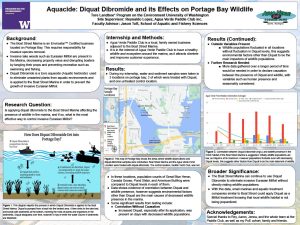AQUACIDE: DIQUAT DIBROMIDE AND ITS EFFECTS ON PORTAGE BAY WILDLIFE
The Boat Street Marina is a small for-profit moorage located on Portage Bay in Seattle, Washington. Each summer the invasive aquatic plant Eurasian Milfoil blooms in the marina, tangling the props of patron boaters, and decreasing the area’s property value. To reduce the presence of Milfoil, the aquatic herbicide Diquat-Dibromide is applied to the marina. Diquat is a non-selective and toxic chemical that is banned in the European Union, however readily available for use in the United States. The Boat Street marina is also habitat to species of bird, reptile, and amphibian which are in contact with the Diquat. However, the effects of Diquat on these wildlife populations has not been researched. The purpose of this study is to determine if correlation between Diquat levels in the marina and wildlife presence exists, and if this treatment technique should be modified. To accomplish this task wildlife populations were counted biweekly in three different locations within the Marina and surrounding area. Water and sediment samples were also taken from two locations in the marina and tested for Diquat concentrations. This data was then compiled onto graphs in order to directly compare Diquat levels to wildlife populations. Results show that with increased levels of Diquat , wildlife populations of observed species decreased. However wildlife populations fluctuated consistently in all three locations without change in Diquat presence. This suggests environmental factors other than Diquat are the main deterrent to wildlife in the Marina, and aquatic herbicide applications can continue without jeopardizing the marinas wildlife.
